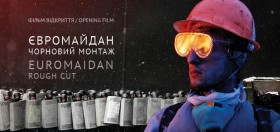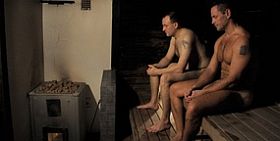6 3D documentaries by Wim Wenders, Michael Glawogger, Michael Madsen, Robert Redford, Margreth Olin and Karim Ainouz. Executive producer: Wim Wenders. Each film is 26 mins. long.
Subtitle: ”If Buildings Could Talk” and this is where the overall problem lies if the idea is that they have to be watched as one film with six locations… I saw it like that at the press screening tuesday and this is how the 6 are to be screened at the Copenhagen Architecture Festival x Film, with one small break.
So for you festival people out there or television buyers – show them one by one, or maybe in pairs, there is a couple of excellent works to be enjoyed. If you – literally – sit and watch buildings talk in first person to you (”I am a building”) film after film, you get exhausted, even more, simply fed up by a constructed verbal concept that almost makes you want to shout ”shut up”, let me watch!
Having said so, of course you can not put all under one roof, the films are different in quality as I will try to phrase in the following mini-reviews that follow the viewing order of my screening:
Wim Wenders: The Berlin Philharmonic
… is so wonderful to watch, and listen to, and the fatigue around the ”I am a building” first person is not there, yet – maybe that’s why Wenders as ex. producer put himself first!? Anyway, you get a beautiful tour in the concert hall, you get information about how the building was constructed, you get the historical background, there is a fine use of archive material, there is a sense
for the detail, Wenders lets the architect Hans Scharoun come alive with his idea of an equal society conveyed in the concert hall. It’s joyful and Simon Rattle as the artistic director and conductor is a great character. The 3D is perfect for that film. Objections: Some characters are introduced in an artificial way like the little boy running to the technical room, the old man who was in the first orchestra, the woman reparing the floor… (4 sharp nibs !!!!)
Michael Glawogger: The National Library of Russia
… is close to my heart as educated librarian (in the last century), and because this is magic St. Petersburg, where you have this fantastic building in the middle of the city, on Nevski Prospekt, where you with Glawogger in a few seconds leave modern times and enter a place full of people and books and index cards and kilometers of bookshelves and students at their small study tables and old ladies sitting in their small booths writing on their cards or taking books out to be transported to the reader in the reading room. Glawogger avoids the ”I am a building”. Instead he lets voices and texts come out from the images – Dostojevski of course, Bunin, Brodsky and many others – unfortunately difficult to understand it all as there are Russian voices in the background with an English voice in the foreground that only gives some of the texts, if I got it right. Visually this film is excellent, there is a flow, a constant movement, great close-ups, small stories within the overall story, Glawogger and his cameraman Wolfgang Thaler succeed to convey their fascination fully. A great visit! (5 sharp nibs !!!!!)
Michael Madsen: Halden Prison (photo)
… is with Glawogger’s film absolutely the best in the collection. His choice of a prison as a cultural cathedral is original, his first person building text is good and balanced – even if I here at the third film in a row started to ask myself if it could have been done in another way than ”what would they say the buildings…” – he has found a tone for the film, and a very simple structure: a man is taken to the prison, he is filmed from behind in a car, he gets out, is checked and taken to his cell.
From there the film goes to the prison’s many locations, in what is called the world’s most human prison. His cameraman (also Thaler) films inmates, who are posing for the film, we see the lovely surroundings, the architectual details and the small house within the prison meant for family visits, and the isolation cell where human shit is being washed from walls and floor… there is also a social element in this film that again shows Madsen’s unique visual talent. (4 sharp nibs !!!!)
Robert Redford: Salk Institute
… is the most conventional, tv-like and boring of the 6 films. Again and again we are invited to watch the same building, again and again Redford lets the same people walk in and out of the building, pose thoughtfully, cross the square etc. I have seen films with architect Kahn before, also images from the Institute, and it would have been much better to tell the story of Salk and Kahn in a non 3D format, that adds nothing to a film that basically is built on the dialogue between the two. (2 sharp nibs !!)
Margreth Olin: The Oslo Opera House
… is the most disappointing for me as I have always admired Olin for her social documentaries and had the hope she could cope with a new theme and a different narrative challenge. What went wrong? The text – ”I am a building” – is very weak, banalities, images drown in clichés – dancers in movements, then stop and freeze the movements into b/w stills, a little bit from that performance, a little bit from another, centered around love and pain, I think, I have to confess that I don’t get the basic idea of the cinematic construction. I am sure there is one. Would have loved to see more of the architecture of a House, that seems magic. (3 sharp nibs !!!)
Karim Ainouz: Centre Pompidou
… is, alas, a film without any atmosphere about a place that this reviewer has enthusiastically visited yearly since it opened. An observational method with some characters to be followed, faces maybe, a process maybe, like Nicolas Philibert did when he was in Louvre, would have helped to create a film. Now it’s just a little bit of everything wrapped in a text about the ”I” = the building that was controversial once, shamed upon as looking as an oil refinery, now having ”the nostalgic charm of a steam engine”. There is no red thread as there are in the works of Glawogger and Madsen, and yes Wenders, who set the whole thing up and thanks for that – with a final result that he can only be partly happy with. (2 sharp nibs !!)




